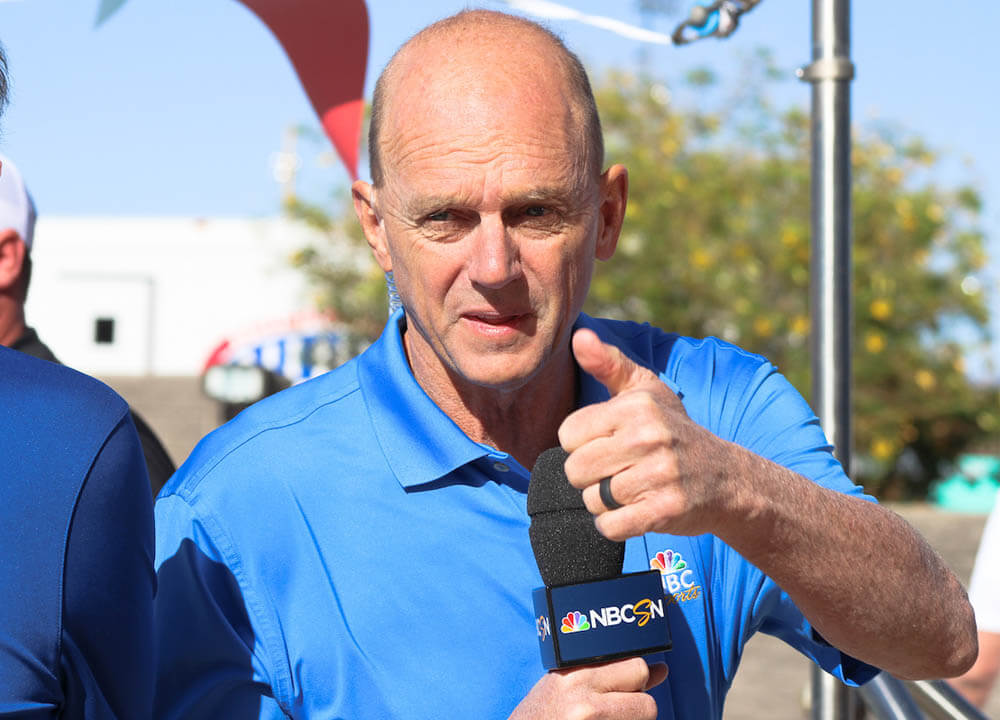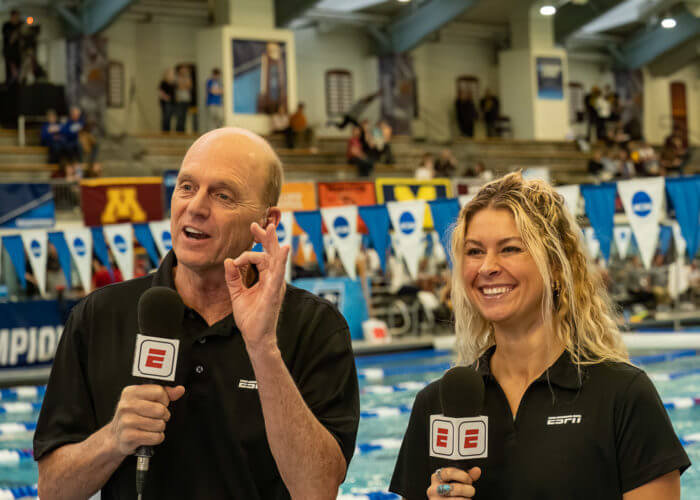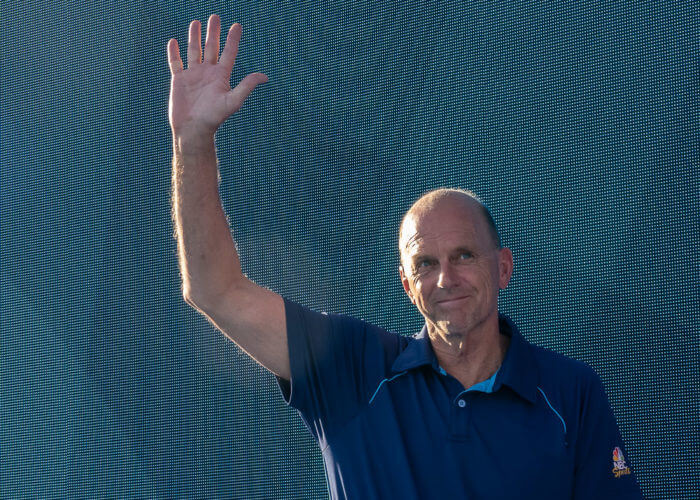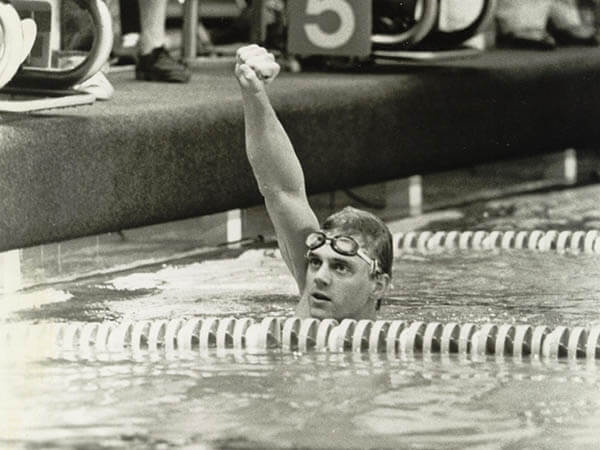SwimLight Feature: Getting to Know Rowdy Gaines, the Man Behind the Iconic Voice of Swimming (Video)

SwimLight Feature: Getting to Know Rowdy Gaines, the Man Behind the Iconic Voice of Swimming (Video)
Rowdy Gaines is a legendary figure in the world of swimming, celebrated not only for his remarkable achievements as a swimmer but also for his influential role as the broadcasting voice of Swimming. Transitioning from the pool to the broadcast booth, Gaines has become a beloved commentator known for his deep insights, infectious enthusiasm, and knowledge of the sport. Over a career spanning soon-to-be nine Olympic Games, he has guided audiences through the thrilling highs and emotional lows of competitive swimming, bringing the sport to life for millions of swimming fans worldwide.
In the heart of Winter Haven, Florida, where the landscape is covered with over 120 lakes, swimming is not just a skill but a way of life. For Rowdy Gaines, this watery playground was the very essence of his upbringing and the foundation of his journey to Olympic glory. After finding his initial passion for swimming in high school, his persistence and dedication to the sport would eventually lead him to greatness.
“I grew up in Winter Haven, Florida, which is like right in the center of the state. There’s like 120 lakes in Winter Haven; it’s 70-something percent water,” Gaines said. “So water was really part of the DNA of who I was growing up. I learned how to swim literally before I learned how to walk, and I swam maybe one summer as a six-, seven-, or eight-year-old on a little country club team. I didn’t start swimming again until 17. I was a junior in high school, and one reason is that I had tried out for so many different sports in high school and kept getting cut, so swimming was just next. I didn’t get cut, and it was something that I certainly fell in love with. It took me a couple of weeks, but I think once I realized I wasn’t going to get cut and I started seeing progress, I just fell in love with it and then literally became obsessed with getting better.”
From the exhilaration of pushing his body to its limits during training to the sense of peace in the water, Gaines feels deeply connected to swimming. He finds satisfaction in the tangible results and the feeling of improvement that follows. In addition, swimming serves as a form of meditation, offering Gaines a sanctuary where he can escape the world’s noise and focus solely on swimming in the water.

Photo Courtesy: Peter H. Bick
“When I was swimming and training for the Olympics, I craved the feeling of what my body, my mind, and my soul felt like when I was finished training,” Gaines said. “I didn’t like training, but I loved the feeling of after it was over with. So, swimming from that perspective, I just love the feeling of exhaustion and knowing that I got better. I didn’t like the process, but I loved the result. The other form is that it’s a sort of a meditation for me. I feel so comfortable in the water. I can take my mind off of everything and just kind of concentrate on the movements of being in the water, which brings me great joy.”
Gaines sees his Olympic journey as a learning experience, emphasizing the importance of commitment, sacrifice, and teamwork. Despite the challenges and moments of doubt, he stayed true to his goals and found comfort in the routine of training. For Gaines, the Olympics served as the culmination of his hard work and a moment of validation for his intense commitment to his goal.
“I know hindsight is kind of a cheat, but in retrospect, it really was about the journey,” Gaines said. “I learned so much about myself during the journey leading up to that. I mean, the lessons I learned at the Olympics probably didn’t amount to much, but I learned a lot about sacrifice and the commitment and the responsibility and the teamwork and all those words that, certainly, you have to kind of learn if you’re going to be a swimmer. It’s not for the faint of heart. So, for me, after the Olympics, it was just really cool to be able to say that I stayed committed to the goal. I didn’t give up. Many days, I wanted to give up, many days. I think a big part of the Olympic experience for me also is this journey is a four-year journey. Well, for me, it was an eight-year journey because I made the team in 1980. So a lot about the journey is getting into a routine. I love routine in my life, so the Olympics was all about having that routine leading up to it. I always look back at the Olympics, and it was just sort of like icing on the cake. The cake part was the journey, and the icing was the Olympic Games.”
Gaines entered broadcasting in the mid-80s, initially covering swimming for TV shows like Battle of the Network Stars. He gradually became more well-known in the sport, commentating on various swimming events before landing his first Olympics gig in 1992. Since then, his broadcasting career has grown, with Paris 2024 marking his ninth Olympics.
“Back in the mid-80s, I was asked to do the swimming part of Battle of the Network Stars. This was a TV show that had different celebrities and B-list actors and actresses compete against each other in different sports, and that happened to be in Orlando,” Gaines said. “Then, they had another event called Battle of the Corporate Stars with different corporations. So I kind of got into that kind of gig where I would call the swimming, and next thing you know, I started doing some stuff for TBS and TNT. They started covering some swimming. I did the Goodwill Games and just kind of slowly but surely built up that resume, and I did my first Olympics in 1992 for Barcelona, and that was NBC. It wasn’t over the air. I did the cable side of things. Then, my first Olympics was in 1996 for NBC, the regular network of NBC. So [Paris 2024] will be my ninth Olympics.”

Photo Courtesy: Peter H. Bick
As the voice of USA swimming, Rowdy Gaines has witnessed many unforgettable moments in the sport. His favorite, the men’s 400-meter freestyle relay in Beijing 2008, is so famous it inspired the documentary The Greatest Race. Gaines also enjoyed broadcasting Michael Phelps’ 100-meter butterfly victory in Beijing 2008, Katie Ledecky’s first gold medal in London 2012, and Misty Hyman’s unexpected win in the 200-meter butterfly in Sydney 2000.
“Well, that’s an easy one. That’s the 400 free relay in Beijing,” Gaines said of his favorite race. “That race is so famous that they did an hour-and-a-half documentary on it. One race, a three-and-a-half minute race and the documentary is called The Greatest Race. But there have been many, I have probably a Mount Rushmore of races, one certainly Michael Phelps, probably, the 100 fly where he won that same Olympics, by one one-hundredth of a second. I think Katie Ledecky, her first gold medal in London, is something that I’ll always remember. I think when Misty Hyman won in 2000, she beat Susie O’Neill in the 200 butterfly. That’s another one that stands out. If you pin me down, I could probably get three or four. But those are the ones that stand out in my mind off the top of my head.”
When it comes to the most anticipated events of the 2024 U.S. Olympic Trials, Gaines is particularly excited. On the men’s side, he believes the 100-meter freestyle will be a race filled with unknowns and fierce competition. For the women, Gaines is most excited to see the 200-meter backstroke, an event so competitive that the sixth-place finisher at the Trials could medal at the Olympics.
“I think I’m a little biased because it’s my race, but there’s two. There’s the men’s 100 freestyle, which I’m most excited about, but there’s so many unknowns about the race, so that’s what makes it so exciting,” Gaines said. “It’s not like (before) where it was kind of like Caeleb [Dressel] and everybody else. Now it’s sort of wide open, and plus, it dictates what our 400 free relay will look like in Paris. So, for me, on the men’s side, it’s the 100 free. For the women, it either has to be the 100 or 200 backstroke, probably the 200 backstroke, because the woman who finishes sixth at the Trials would probably win a medal at the Olympics; that’s how good that event is for the women. So that’s the most exciting one, I think for me. The 200 IM will be cool, and the women’s 50 will be amazing. I mean, the women have so many incredible events, but if I had to pick one, it’s probably the women’s 200 backstroke.”
Gaines advises swimmers preparing for the U.S. Olympic Trials to stay focused while in the arena but leave the stress behind once they walk out of the venue. He emphasizes the importance of balance, recalling how he managed to keep his mind off of the competition by distracting himself with music, TV, and non-swimming conversations. Gaines’ key advice is to be all-in when competing but to find ways to relax and unwind outside of competing.

Rowdy Gaines
“Well, I’m probably the last one now to give advice to these kids because it’s a completely different sport than when I swam, but the feelings are still the same,” Gaines said. “The feelings of anticipation and stress and anxiety, and for me, I think the best advice I could give is when you walk into the arena, you’re all in. You put the blinders on and your game face the entire time. But when you leave the arena, leave it there, and I tried to do that, especially at our Trials in ’84. Otherwise, it’s going to eat you alive if you live and breathe it outside that arena because it’s just such an anxious time. So, I did everything in my power to try to take my mind off of it. I’d sit there in front of the TV. We didn’t have internet or anything. So, I would do everything in my power to forget about swimming. I wouldn’t talk about it with my friends. My coach and I would go to dinner, and we would talk about completely different stuff, and he knew the kind of, hey, listen, let’s leave it there. When we get there, you’re all in. But when we leave there, we leave it there.”
Gaines had a couple of unique pre-race rituals that he followed throughout his swimming career. One of his superstitions was elevating his feet for five minutes before every race, a ritual he began in high school. Additionally, Gaines always swam double-arm backstroke during his warm-down, a ritual he never skipped before he was finished swimming.
“I would always have to put my feet up. I would lay down anywhere and literally elevate my feet,” Gaines said. “It was a superstition of mine that I always had to do before a race. I had to take five minutes and elevate my feet. Which I did pretty much starting my whole career. I remember somebody telling me in high school, and I’m sure it was just an urban legend, but that was a superstition, and I always had to do double-arm backstroke before I got out of the water. So weird. Right before I got out, after I swam, during the warm down, at some point in the warm down, I had to do double-arm backstroke.”
If Rowdy Gaines could create a new swimming event, he would likely focus on the underwater dolphin kick. Acknowledging the dangers of this potential event, Gaines suggests an underwater race where swimmers must breathe and take a stroke every 25. He is fascinated by how swimmers today can disappear underwater for so long, reminding him of the days when he competed.
“I’m guessing it would be the fifth stroke that’s already out there. [Underwater dolphin kick] is a little tricky because it’s also potentially dangerous,” Gaines said. “You know, it used to be it go as far as you wanted to, and they changed that obviously. So, there’s an inherent danger in holding your breath. So I’d probably implement that it’s an underwater, but you have to come up and breathe and take a stroke for a 25 or two strokes for a 25 or something. One arm cycle, one stroke. I don’t know, but I think it’s cool that everybody just disappears underwater. In the old days, they would go 45 meters underwater.”
When asked about his favorite pool of all time, Rowdy Gaines says it is the IU Natatorium in Indianapolis, which he compared to iconic sports venues like Wrigley Field and Fenway Park. This historic facility, where Gaines made the Olympic team in 1984, holds a special place in his heart. Despite the existence of older pools, Indy remains a central hub for swimming, making it Gaines’ favorite pool to return to time and time again.
“That’s an easy one, too. It has to be in Indy because Indy is sort of our Wrigley Field, Fenway Park,” Gaines said. “Wrigley Field has been around for 100 years. We don’t have a Wrigley Field. Our oldest facility is probably Indy, which we still compete in. We have older pools, obviously, but we don’t compete in them anymore, but we still go to Indy. I made the Olympic team in 1984, 40 years ago in Indy. It’s sort of our Wrigley, and that’s my favorite pool to go to.”




Great interview Rowdy! Perhaps you and Jude can take in some Artistic Swimming in Paris — the Acro Event 8/6 — is probably the most spectacular!
— Lorraine Bloeth Valerino
1978 Winter Haven High School grad
Current Lakeland Y Flamingo Synchro Coach